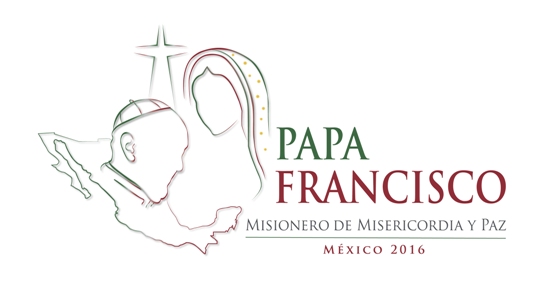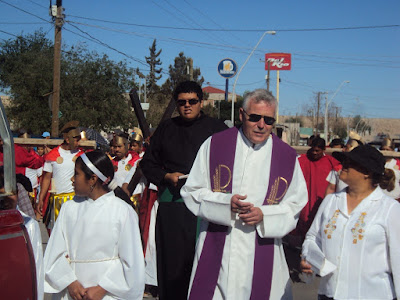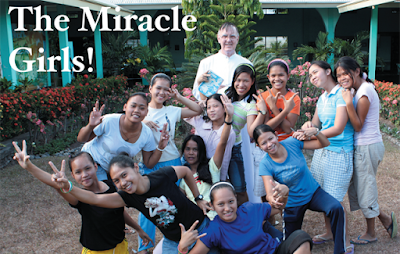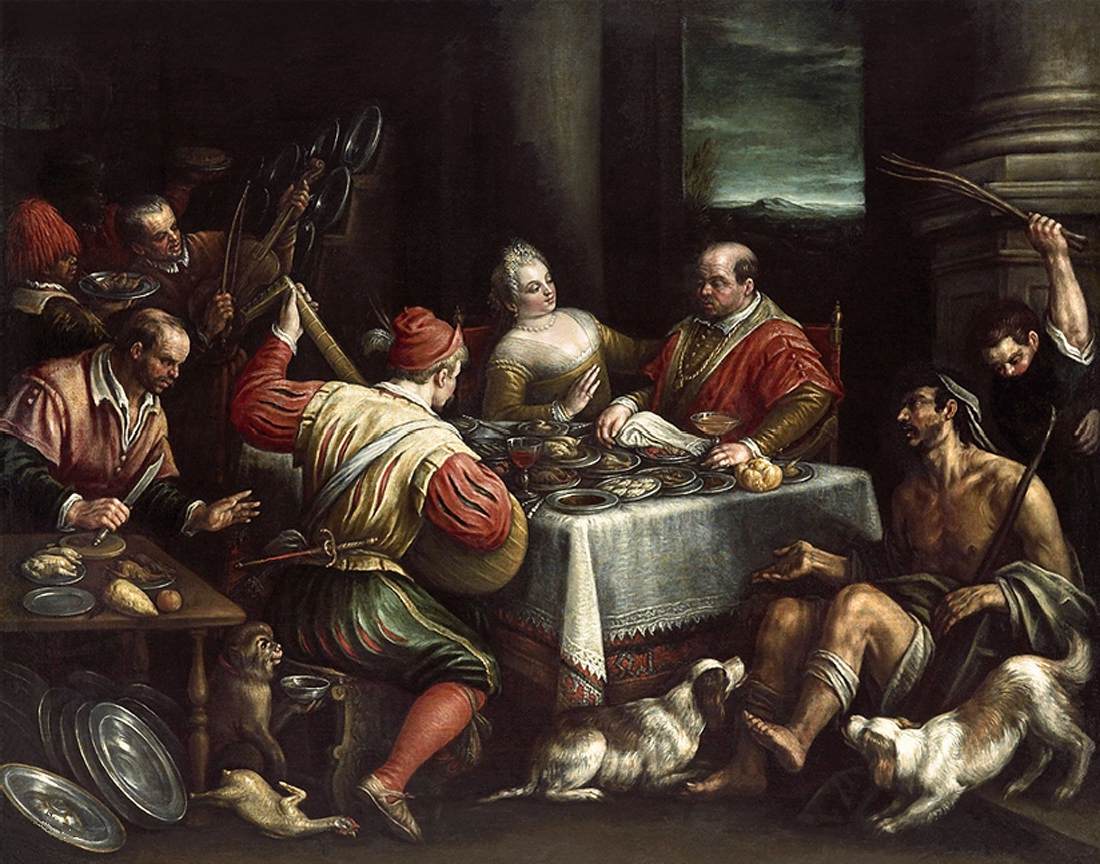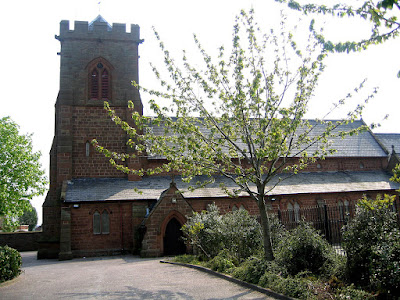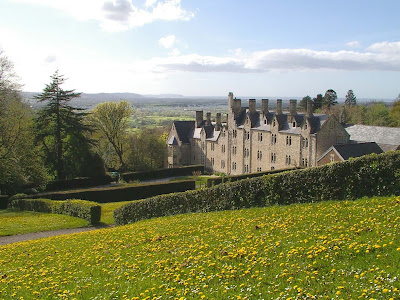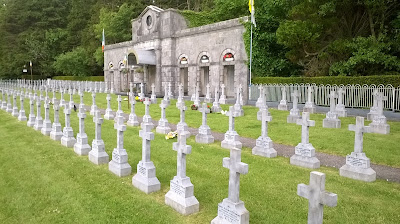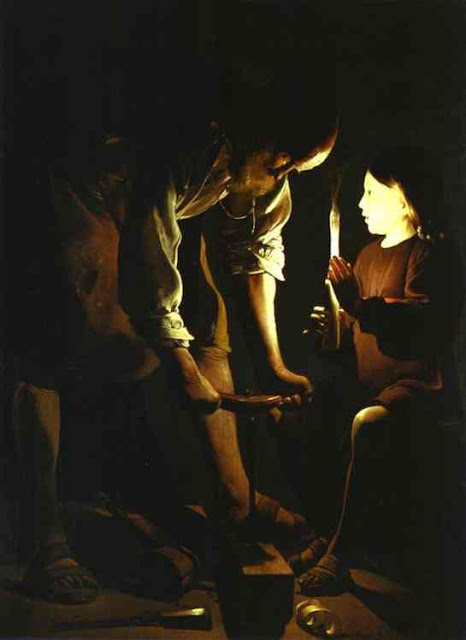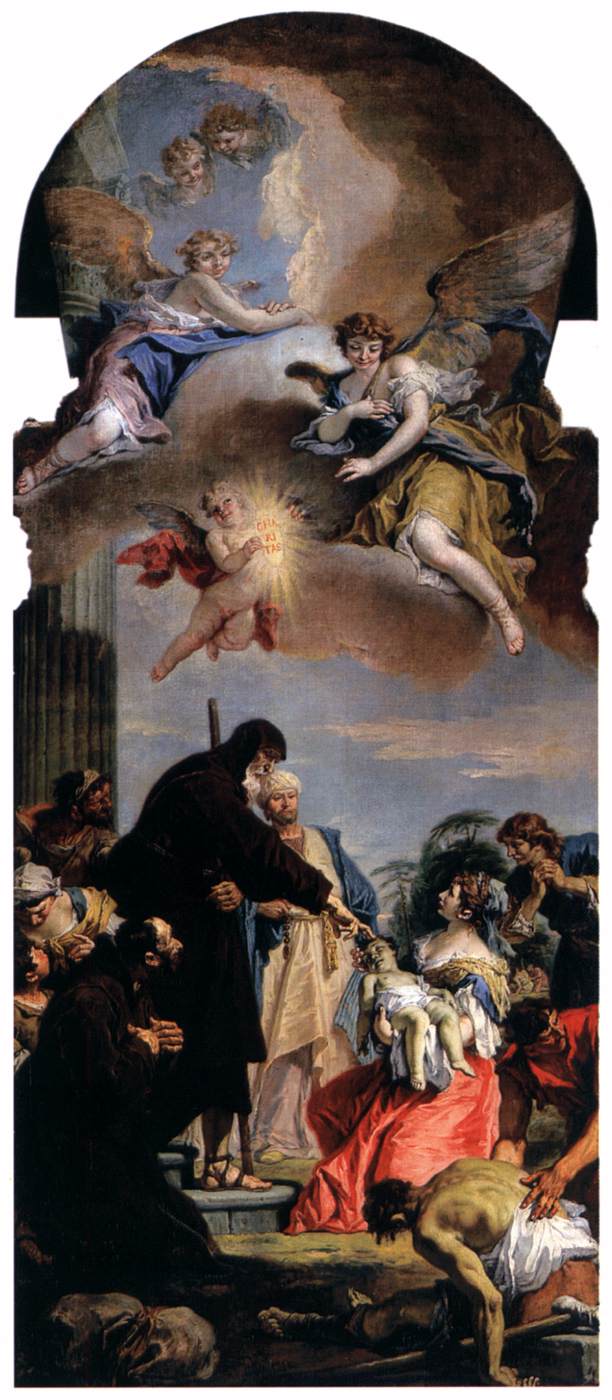‘This is my Son, my Chosen; listen to him!’ Sunday Reflections, 2nd Sunday of Lent, Year C
Transfiguration, Fra Angelico, 1440-42
Convento di San Marco, Florence [Web Gallery of Art]
Readings (New American Bible: Philippines, USA)
Readings (Jerusalem Bible: Australia, England & Wales, India [optional], Ireland, New Zealand, Pakistan, Scotland, South Africa)
Gospel Luke 9:28B-36 (New Revised Standard Version, Catholic Edition, Canada)
Jesus took with him Peter and John and James, and went up on the mountain to pray. And while he was praying, the appearance of his face changed, and his clothes became dazzling white. Suddenly they saw two men, Moses and Elijah, talking to him. They appeared in glory and were speaking of his departure, which he was about to accomplish at Jerusalem. Now Peter and his companions were weighed down with sleep; but since they had stayed awake, they saw his glory and the two men who stood with him. Just as they were leaving him, Peter said to Jesus, “Master, it is good for us to be here; let us make three dwellings, one for you, one for Moses, and one for Elijah”—not knowing what he said. While he was saying this, a cloud came and overshadowed them; and they were terrified as they entered the cloud. Then from the cloud came a voice that said, “This is my Son, my Chosen; listen to him!” When the voice had spoken, Jesus was found alone. And they kept silent and in those days told no one any of the things they had seen.

Black Rock Desert, Nevada [Wikipedia]
[The LORD] brought [Abram] outside and said, “Look toward heaven and count the stars, if you are able to count them.” Then he said to him, “So shall your descendants be.” ( From First Reading, Gen 15:5, NRSVCE).
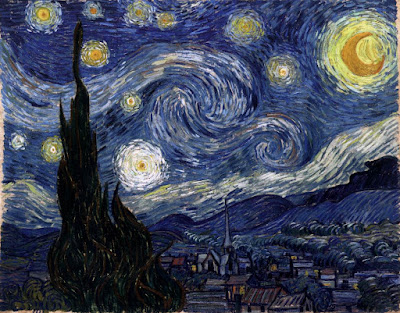
Starry Night, June 1889, Saint-Rémy, Van Gogh
Musem of Modern Art, New York City [Web Gallery of Art]
+++
By the mystery of this water and wine may we come to share in the divinity of Christ who humbled himself to share in our humanity.
The deacon or priest says these words quietly as he pours wine and a little water into the chalice during the Offertory of the Mass. In today’s gospel Jesus, who humbled himself to share in our humanity, allowed Peter, James and John to get a glimpse of his divinity. Moses and Elijah spoke of what Jesus was to accomplish at Jerusalem. That was not only his death but his Resurrection and glorification.
Jesus calls us to share in his Resurrection and glorification, to share in the divinity that is his.
We don’t share in the Resurrection, glorification and divinity of Jesus Christ only after death but also, as Peter, James and John did in the Transfiguration, in this life when we experience the gift of God’s love in events that can transform us here and now.
My Australian fellow Columban, Fr Warren Kinne, who worked in Mindanao, Philippines, for many years and is now in China, tells the story of Xiao Ai, who was in her early days a ‘non-person’. But through the love and care of strangers, Chinese and foreign, she now has possibilities open to her that she never could have imagined. And Father Warren, who has some Chinese ancestry, sees her story as encapsulating in some ways the meaning of Lent and Easter. Here’s how he tells it. It’s taken from the January-February 2013 issue of MISYONonline.com, the Columban online magazine I edit in the Philippines.
Courage to live a Lent
by Fr Warren Kinne
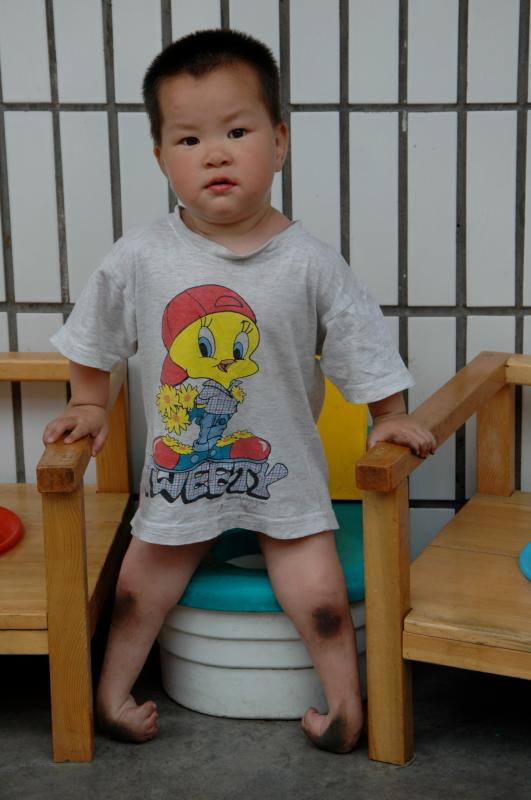
Xiao Ai
Before the great Feast of Easter when we celebrate the death and resurrection of Jesus, the Church goes through a period of preparation by prayer and fasting. We call this Lent. In the northern hemisphere, where Christianity started, it was celebrated in spring and slowly, throughout that time, the dead of winter burst forth into the luxuriance of new growth, signifying life and the resurrection.
Xiao Ai is a young friend of mine. She was left at the steps of a convent about 2004 or 2005 in a remote village of Shan Xi Province, China. She was born with clubbed feet and abandoned. Xiao was brought to Shanghai where a group of foreigners provided money and logistical support for multiple operations.
During that period she was taken in by a family who took great care of her and eventually wanted to adopt her as their own. However there were many hurdles to be overcome. Xiao Ai did not have any identification as the convent was not a registered orphanage and so was not in a position to register her.
Indeed people could only guess at her actual birth date. She was really a ‘non-person’.
After years of effort Xiao Ai has had all her paperwork completed and she now has a Chinese passport that will allow her to travel with her adopted family to Singapore. What happiness followed the long and anxious wait where a wonderful outcome was hoped for rather than expected.
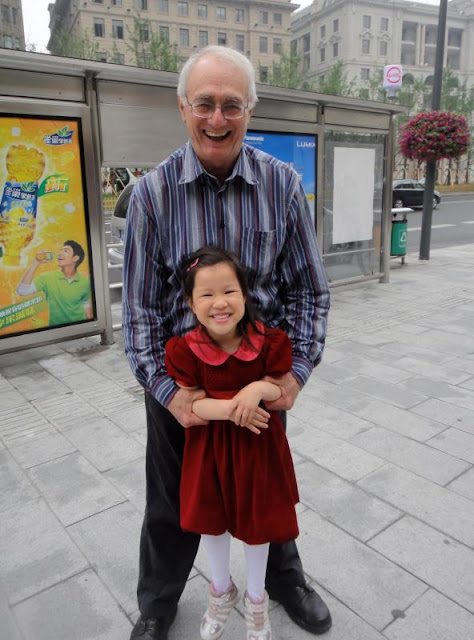
Xiao Ai and Fr Warren Kinne
For the Lord takes delight in his people
(Psalm 149:4, Grail translation)
Xiao’s struggle to me is a Lenten story that has become an Easter story; a fast that turned into a feast; a long journey in a desert that ended in freedom; a near death that heralded a resurrection, a new life.
Shanghai is a city of tinsel and glitter. Most people recognize the image of its iconic buildings and towering structures along the Huang Pu River. There are myriad neon signs and a ‘yuppie’ lifestyle for many expatriates who ride the wave of economic frenzy. But it has its under-belly.
The construction of this city has been done on the backs of migrant workers – currently seven million – who have travelled to the city to find work. They left their villages and often their families in order to make a little money on construction sites and in restaurants and factories.
These people do not have residency permits in Shanghai and so they cannot settle down where they work. Often they leave their children back in the village in the care of grandparents and may only get home once a year – during the Chinese New Year – to see how the family is going.
Children can resent their absence and may not appreciate the sacrifice of the parent or parents in order to better the whole family economically.
In the cities where they work they do not have equal access to medical and educational opportunities that are open to the local population.
Their sacrifice is a sort of ‘Lent’ lived in the hope of a better future for their family. Like Xiao Ai’s adopting parents or the migrant parents, they in fact live the admonition of God in Isaiah 58: 6-7: ‘Is not this the fast that I choose: to share your bread with the hungry and bring the homeless poor into your house; when you see the naked, to cover him’.
God brought the slaves out of the land of Egypt where they had made bricks for the ostentatious buildings of the Pharaohs. This same God made a covenant with them and subsequently with us that we might treat each other differently because in one way or another we have all been freed. The worship of the market and the God of money has caused many to suffer. May we all have the courage to live a Lent that will usher in true life for the world.
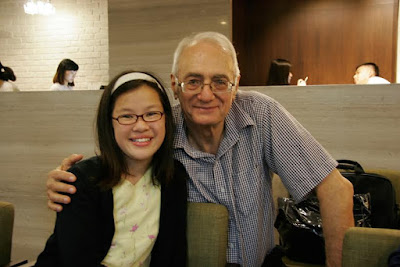
A recent photo of Xiao Ai and Father Warren
A younger Xiao Ai with a song of greeting for the Lunar/Chinese New Year.
Gong Xi Fa Cai
恭喜发财
Although the Lunar New Year celebration is over I don’t think it inappropriate to include the song here. What comes to my mind each time I look at the photo of Xiao Ai with Father Warren and when I watch the video of this young girl born a ‘non-person’ is the truth of Genesis 1: 26, Then God said, ‘Let us make man in our image, after our likeness’ (RSVCE).

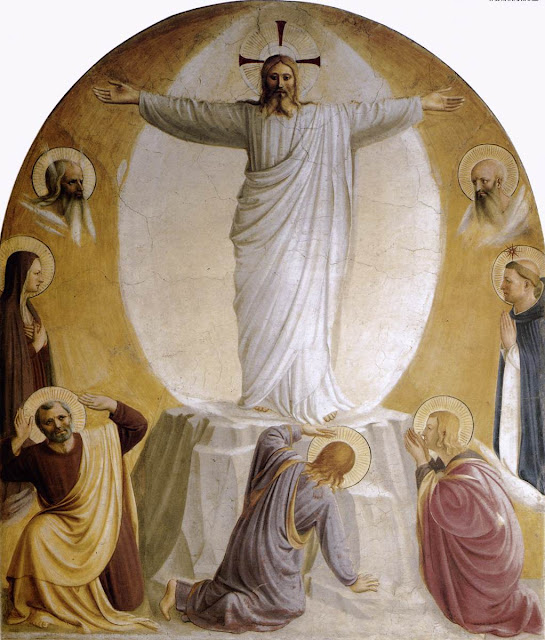


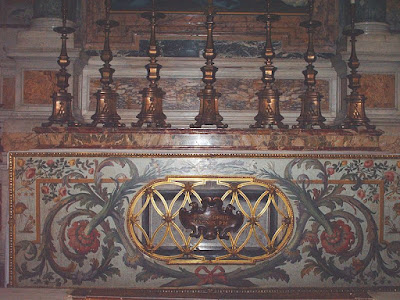
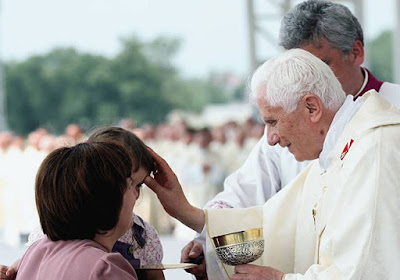

 . .
. .

